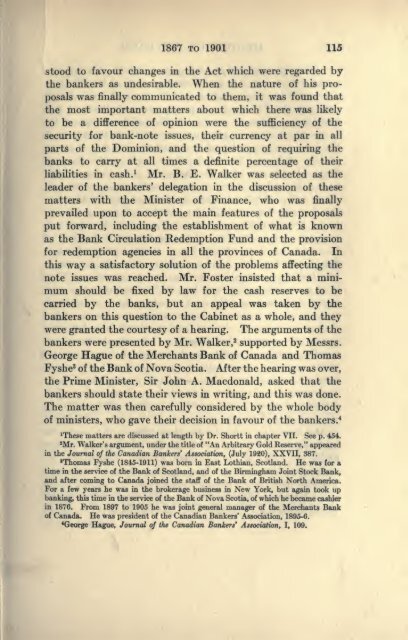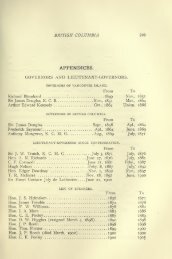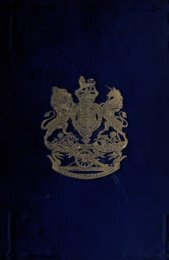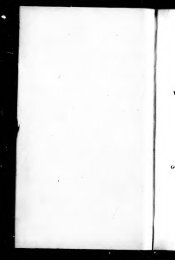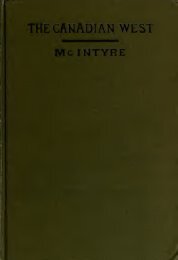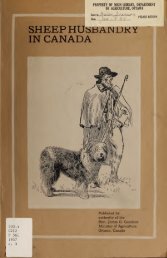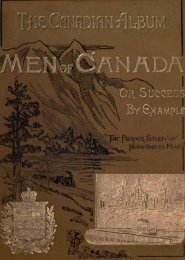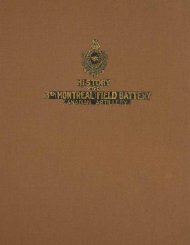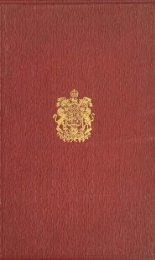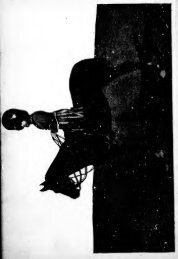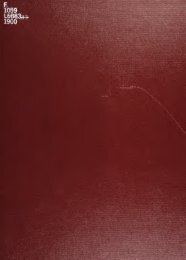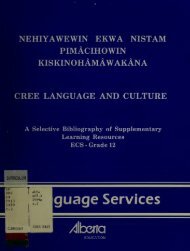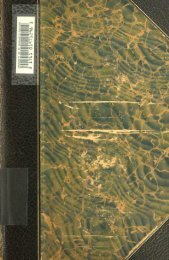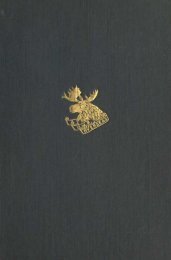- Page 7:
A HISTORYOFTHE CANADIAN BANKOF COMM
- Page 11 and 12:
A HISTORYOFTHE CANADIAN BANKOF COMM
- Page 13 and 14:
PREFACE[S volume closes at the end
- Page 15:
PrefaceContentsIllustrationsCHAPTER
- Page 18 and 19:
xILLUSTRATIONSPLATENO.FACINGPAGE25
- Page 20 and 21:
XllILLUSTRATIONSNO.63 TCamloops, B.
- Page 24 and 25:
IPLATtIHI Hov \\II.I.I\M M.MASTERFi
- Page 26 and 27:
2 HISTORY OF THE BANKbrought about
- Page 28 and 29:
4 HISTORY OF THE BANKthat, because
- Page 30 and 31:
6 HISTORY OF THE BANKtain the usual
- Page 33 and 34:
THE CHARTER 7the Grand Trunk Railwa
- Page 35 and 36:
THE CHARTER 9proposed bank was to s
- Page 37 and 38:
THE CHARTER 11province or secured b
- Page 39 and 40:
THE CHARTER 13enterprise, perhaps t
- Page 41:
I'I.VTI-: No. |.rilAKLOTTKTCNYN. IV
- Page 44 and 45:
16 HISTORY OF THE BANKpresently be
- Page 46 and 47:
18 HISTORY OF THE BANKMontreal, or
- Page 49 and 50:
THE CHARTER 19financial and commerc
- Page 51 and 52:
THE CHARTER 21of London, 9 who had
- Page 53 and 54:
THE CHARTER 23many of them stand ve
- Page 55 and 56:
THE CHARTER 25drew on the Mancheste
- Page 57 and 58:
THE CHARTER 27Confederation, Mr. Ro
- Page 59 and 60:
THE CHARTER 29Company. It is signif
- Page 61 and 62:
THE CHARTER 31opposition that at ti
- Page 63 and 64:
THE CHARTER 33made its appearance,
- Page 65:
PLATE No. C.EDMONTON, ALTA.
- Page 68 and 69:
36 HISTORY OF THE BANKarrival of Lo
- Page 70 and 71:
38 HISTORY OF THE BANKinto in Novem
- Page 72 and 73:
40 HISTORY OF THE BANKis certain, I
- Page 74 and 75:
42 HISTORY OF THE BANKlater he anno
- Page 76 and 77:
44 HISTORY OF THE BANKCanada banks,
- Page 78 and 79:
46 HISTORY OF THE BANKConservative
- Page 83 and 84:
CHAPTER II.1867 TO 1901.We may now
- Page 85 and 86:
1867 TO 1901 51to open an account w
- Page 87 and 88:
1867 TO 1901 53committee to select
- Page 89:
-3* IX ;-- rii8111'l.ATK No. 7.
- Page 92 and 93:
56 HISTORY OF THE BANKas scrutineer
- Page 94 and 95:
58 HISTORY OF THE BANKtime contribu
- Page 96 and 97:
60 HISTORY OF THE BANKeven terms wi
- Page 98 and 99:
62 HISTORY OF THE BANKwere $32,003,
- Page 101 and 102:
1867 TO 1901 63The opening of the N
- Page 103 and 104:
1867 TO 1901 65and bamboo wares, st
- Page 105:
I'l.VPK No. !).NEW YORK, X.Y.
- Page 108 and 109:
68 HISTORY OF THE BANKwith Great Br
- Page 110 and 111:
70 HISTORY OF THE BANKParkhill. Win
- Page 112 and 113:
72 HISTORY OF THE BANKSaskatchewan
- Page 114 and 115:
74 HISTORY OF THE BANKmoney. The Am
- Page 116 and 117:
76 HISTORY OF THE BANKelected to su
- Page 118 and 119: 78 HISTORY OF THE BANKequalled. Alt
- Page 120 and 121: 80 HISTORY OF THE BANKThe minute bo
- Page 122 and 123: 82 HISTORY OF THE BANKcontaining $1
- Page 125 and 126: 1867 TO 1901 83Dunclas branch, the
- Page 127 and 128: 1867 TO 1901 85sequences; on the ot
- Page 129: PLATE No. 11.us
- Page 132 and 133: 88 HISTORY OF THE BANKGreat Britain
- Page 134 and 135: 90 HISTORY OF THE BANKof the Provin
- Page 136 and 137: 92 HISTORY OF THE BANKare quoted in
- Page 138 and 139: 94 HISTORY OF THE BANKthe officers
- Page 141 and 142: 1867 TO 1901 95front door of the of
- Page 143 and 144: 1867 TO 1901 97Darling, 1president
- Page 145: ( OUNKR OF KING AND JORDAN STREETS,
- Page 148 and 149: 100 HISTORY OF THE BANKsite was ere
- Page 150 and 151: 102 HISTORY OF THE BANKpublic caree
- Page 153 and 154: 1867 TO 1901 103this examination ha
- Page 155 and 156: 1867 TO 1901 105As a guide for the
- Page 157 and 158: 1867 TO 1901 107chosen to succeed M
- Page 159 and 160: 1867 TO 1901 109January, 1887. Her
- Page 161: PLATE No. 15.REGINA, SASK.
- Page 164 and 165: 112 HISTORY OF THE BANKIn his actio
- Page 166 and 167: 114 HISTORY OF THE BANKby the death
- Page 170 and 171: 116 HISTORY OF THE BANKThe outcome
- Page 172 and 173: 118 HISTORY OF THE BANKbut others i
- Page 174 and 175: 120 HISTORY OF THE BANKendowment of
- Page 176 and 177: 122 HISTORY OF THE BANKa gloomy yea
- Page 178 and 179: 124 HISTORY OF THE BANKwas 61,000,0
- Page 180 and 181: 126 HISTORY OF THE BANKfifty, but i
- Page 182 and 183: 128 HISTORY OF THE BANKLIABILITIES.
- Page 184 and 185: 130 HISTORY OF THE BANKwas to obtai
- Page 187 and 188: 1867 TO 1901 131paid, would be unde
- Page 189 and 190: The taking over of the business of1
- Page 191: !etSofPLATE No. 18.
- Page 196 and 197: YUKON TERKHQfRrJttMDSURROUNDING COO
- Page 198 and 199: 138 HISTORY OF THE BANKfor receivin
- Page 200 and 201: 140 HISTORY OF THE BANKPass numbere
- Page 203 and 204: THE YUKON ADVENTURE 141TheChilkoot
- Page 205: THE WHITE PASSThe 6rst Canadian Ban
- Page 208 and 209: 144 HISTORY OF THE BANKstay bottom
- Page 210 and 211: 146 HISTORY OF THE BANKwind had shi
- Page 213 and 214: THE YUKON ADVENTURE 147were accompl
- Page 215 and 216: THE YUKON ADVENTURE 149could comple
- Page 217: PLATE No.
- Page 220 and 221:
152 HISTORY OF THE BANKjail by Insp
- Page 222 and 223:
154 HISTORY OF THE BANKfortune in s
- Page 224 and 225:
156 HISTORY OF THE BANKwent ahead i
- Page 226 and 227:
158 HISTORY OF THE BANKTHE CANADIAN
- Page 229 and 230:
THE YUKON ADVENTURE 159and replenis
- Page 231 and 232:
THE YUKON ADVENTURE 161ability to s
- Page 233:
FIRST ASSAY QUARTERS IN THE BANK'S
- Page 236 and 237:
164 HISTORY OF THE BANKcommunity in
- Page 238:
166 HISTORY OF THE BANKof the earli
- Page 241 and 242:
for the bank, the finalTHE YUKON AD
- Page 243 and 244:
THE YUKON ADVENTURE 169secure anyth
- Page 245 and 246:
THE YUKON ADVENTURE 171the Mounted
- Page 247 and 248:
THE YUKON ADVENTURE 173methods the
- Page 249:
KLONDIKE RIVER BLUF*Freighting good
- Page 252 and 253:
176 HISTORY OF THE BANKbecame adequ
- Page 254 and 255:
178 HISTORY OF THE BANKand dredging
- Page 257 and 258:
THE YUKON ADVENTURE 179of dishes.pr
- Page 259 and 260:
THE YUKON ADVENTURE 181after being
- Page 261:
THE WINNIPEG STAFF IN WINTER GARB 1
- Page 264 and 265:
184 HISTORY OF THE BANKonly bricks
- Page 266 and 267:
186 HISTORY OF THE BANKline from La
- Page 268 and 269:
188 HISTORY OF THE BANKbusiness hou
- Page 270 and 271:
190 HISTORY OF THE BANKbranch at th
- Page 273 and 274:
THE YUKON ADVENTURE 191Development
- Page 275 and 276:
THE YUKON ADVENTURE 193was incorpor
- Page 277:
PLATE No. 31.
- Page 280 and 281:
196 HISTORY OF THE BANKThe summer n
- Page 282:
198 HISTORY OF THE BANKunique pione
- Page 286 and 287:
200 HISTORY OF THE BANKThe Canadian
- Page 288 and 289:
202 HISTORY OF THE BANKthe Great No
- Page 290 and 291:
204 HISTORY OF THE BANKwhich Sir Jo
- Page 292 and 293:
206 HISTORY OF THE BANKwho were eve
- Page 295 and 296:
1901 TO 1914 S07Railway, was in emb
- Page 297 and 298:
1901 TO 1914 209Ontario branches we
- Page 299:
iB r" Brv O vBv B v OTHE BRONZE ENT
- Page 302 and 303:
212 HISTORY OF THE BANKRobie Uniack
- Page 304 and 305:
214 HISTORY OF THE BANKofin Sanplac
- Page 307 and 308:
1901 TO 1914 215January 31, 1901, t
- Page 309 and 310:
1901 TO 1914 217the branches were n
- Page 311 and 312:
1901 TO 1914 219manner. In 1901 the
- Page 313 and 314:
1901 TO 1914Although Canada was sti
- Page 315:
PLATE No. 35.
- Page 318 and 319:
224 HISTORY OF THE BANKof disastrou
- Page 320 and 321:
226 HISTORY OF THE BANKand fifty-do
- Page 323 and 324:
1901 TO 1914 227Under this arrangem
- Page 325 and 326:
1901 TO 1914 229GENERAL STATEMENTLI
- Page 327:
PLATE No. 37.MONTREAL, P.Q. (Interi
- Page 330 and 331:
232 HISTORY OF THE BANKSome years p
- Page 332 and 333:
234 HISTORY OF THE BANKHon. George
- Page 334 and 335:
23(5 HISTORY OF THE BANKfor increas
- Page 336 and 337:
HISTORY OF THE BANKcorrespondents,
- Page 339 and 340:
1901 TO 1914 239Canada was in a fai
- Page 341 and 342:
1901 TO 1914 241taken over. There h
- Page 344 and 345:
THE CANADIAN BANK OF COMMERCEWE ISS
- Page 346 and 347:
344 HISTORY OF THE BANKany part of
- Page 348 and 349:
246 HISTORY OF THE BANKDecember, 19
- Page 351 and 352:
1901 TO 1914 247passed away in June
- Page 353 and 354:
1901 TO 1914 249$3,173,000 ; safes
- Page 355 and 356:
1901 TO 1914 2514; and in Mexico, 1
- Page 357 and 358:
Bank of Commerce.1901 TO 1914 253Du
- Page 359:
GUELPH, OXT.'I.VTI: No. 41.WATKHLOO
- Page 362 and 363:
256 HISTORY OF THE BANKthis informa
- Page 364 and 365:
258 HISTORY OF THE BANKThe annual p
- Page 367 and 368:
1901 TO 1914 259the shares of which
- Page 369 and 370:
1901 TO 1914 261the counterfeiter h
- Page 371:
KINGSTON, ONT.I'HTK N.. 4:1.BKM.KVI
- Page 375 and 376:
CHAPTER V.THE ROMANCE OF BANKING.In
- Page 377 and 378:
THE ROMANCE OF BANKING 267United St
- Page 379 and 380:
THE ROMANCE OF BANKING 269Commerce,
- Page 381:
PLATE No. 44.
- Page 384 and 385:
272 HISTORY OF THE BANKEverything w
- Page 386 and 387:
274 HISTORY OF THE BANKat both plac
- Page 389 and 390:
THE ROMANCE OF BANKING 275formerly
- Page 391 and 392:
THE ROMANCE OF BANKINGS77hill to wa
- Page 393:
THE COBALT MANAGER VISITING THE POR
- Page 396 and 397:
280 HISTORY OF THE BANKbuilding of
- Page 398 and 399:
282 HISTORY OF THE BANKspeculation
- Page 400 and 401:
284 HISTORY OF THE BANKtrunks, on t
- Page 402 and 403:
286 HISTORY OF THE BANKexplosion oc
- Page 405 and 406:
THE ROMANCE OF BANKING 287on the fl
- Page 407 and 408:
THE ROMANCE OF BANKING 289fires, wh
- Page 409:
THE SAN FRANCISCO DISASTER OF 1906T
- Page 412 and 413:
292 HISTORY OF THE BANKprayed in th
- Page 414 and 415:
294 HISTORY OF THE BANK"As the fire
- Page 417 and 418:
THE ROMANCE OF BANKING 295were wood
- Page 419 and 420:
THE ROMANCE OF BANKING 297at these
- Page 421 and 422:
THE ROMANCE OF BANKING 299them that
- Page 423 and 424:
THE ROMANCE OF BANKING 301the forme
- Page 425:
1'l.ATK No. 50.MEXICO CITY. MKX,
- Page 428 and 429:
304 HISTORY OF THE BANKhouse for fi
- Page 433 and 434:
CHAPTER VI.THE BANK DURING THE WAR.
- Page 435 and 436:
THE BANK DURING THE WAR 309by the L
- Page 437:
GOWGANDA, ONT.Temporary premises of
- Page 440 and 441:
312 HISTORY OF THE BANKresorted to
- Page 442 and 443:
314 HISTORY OF THE BANKand disturb
- Page 444 and 445:
316 HISTORY OF THE BANKgiven." It w
- Page 446 and 447:
318 HISTORY OF THE BANKirrespective
- Page 449 and 450:
THE BANK DURING THE WAR 319of a che
- Page 451 and 452:
THE BANK DURING THE WAR 321was fran
- Page 453:
PLATE No. 53.
- Page 456 and 457:
324 HISTORY OF THE BANKfeel called
- Page 458 and 459:
326 HISTORY OF THE BANKcompleted at
- Page 460 and 461:
328 HISTORY OF THE BANKIt is of cou
- Page 462 and 463:
330 HISTORY OF THE BANKplaced at th
- Page 464 and 465:
332 HISTORY OF THE BANKrecruits for
- Page 466 and 467:
334 HISTORY OF THE BANKDuring the f
- Page 468 and 469:
336 HISTORY OF THE BANKIn June, 191
- Page 470 and 471:
338 HISTORY OF THE BANKThe volume o
- Page 473 and 474:
THE BANK DURING THE WAR 339securiti
- Page 475 and 476:
THE BANK DURING THE WAR 341volume.
- Page 477 and 478:
THE BANK DURING THE WAR 343The Lond
- Page 479 and 480:
THE BANK DURING THE WAR 345be sold
- Page 481 and 482:
THE BANK DURING THE WAR 347and the
- Page 483 and 484:
THE BANK DURING THE WAR 349Empire.
- Page 485 and 486:
THE BANK DURING THE WAR 351March. T
- Page 487 and 488:
THE BANK DURING THE WAR 353of consc
- Page 489:
CALGARY, ALTA., FIRST STREET WEST B
- Page 492 and 493:
356 HISTORY OF THE BANKbut withdraw
- Page 494 and 495:
358 HISTORY OF THE BANKCanadian Ban
- Page 496 and 497:
360 HISTORY OF THE BANKIn view of t
- Page 498 and 499:
362 HISTORY OF THE BANKwitness to t
- Page 500 and 501:
364 HISTORY OF THE BANKexecutive de
- Page 502 and 503:
366 HISTORY OF THE BANKpayable by t
- Page 504 and 505:
368 HISTORY OF THE BANKevidence of
- Page 506 and 507:
370 HISTORY OF THE BANKThe policy o
- Page 509 and 510:
THE BANK DURING THE WAR 371public,
- Page 511 and 512:
THE BANK DURING THE WAR 373the loca
- Page 513:
PLATE No. 57.
- Page 516 and 517:
376 HISTORY OF THE BANKreplying to
- Page 518 and 519:
378 HISTORY OF THE BANKThe granting
- Page 520 and 521:
380 HISTORY OF THE BANKThe shortage
- Page 522 and 523:
382 HISTORY OF THE BANKThe epidemic
- Page 525 and 526:
THE BANK DURING THE WAR 383almost e
- Page 527 and 528:
THE BANK DURING THE WAR 385of one p
- Page 529:
PLATE No. 59.ST. JOHN, N.B.
- Page 532 and 533:
388 HISTORY OF THE BANKBrought forw
- Page 534 and 535:
390 HISTORY OF THE BANKCompany of t
- Page 536 and 537:
392 HISTORY OF THE BANKThe affairs
- Page 538 and 539:
394 HISTORY OF THE BANKwas given, a
- Page 540 and 541:
396 HISTORY OF THE BANKof His Majes
- Page 542 and 543:
398 HISTORY OF THE BANKwhich the di
- Page 544 and 545:
400 HISTORY OF THE BANKfor by the r
- Page 546 and 547:
402 HISTORY OF THE BANKliabilitycon
- Page 549 and 550:
DEVELOPMENT OF CANADIAN BANKING 403
- Page 551 and 552:
DEVELOPMENT OF CANADIAN BANKING 405
- Page 553 and 554:
DEVELOPMENT OF CANADIAN BANKING 407
- Page 555 and 556:
DEVELOPMENT OF CANADIAN BANKING 409
- Page 557 and 558:
DEVELOPMENT OF CANADIAN BANKING 411
- Page 559 and 560:
DEVELOPMENT OF CANADIAN BANKING 413
- Page 561 and 562:
DEVELOPMENT OF CANADIAN BANKING 415
- Page 563 and 564:
DEVELOPMENT OF CANADIAN BANKING 417
- Page 565:
SOIHIS, P.E.I.AVER'S CLIFF, P.Q.COA
- Page 568 and 569:
420 HISTORY OF THE BANKIn 1859 an A
- Page 570 and 571:
422 HISTORY OF THE BANK"The courts
- Page 572 and 573:
424 HISTORY OF THE BANKVery few inn
- Page 574 and 575:
426 HISTORY OF THE BANKit difficult
- Page 576 and 577:
428 HISTORY OF THE BANKon demand, t
- Page 578 and 579:
430 HISTORY OF THE BANKnote circula
- Page 580 and 581:
432 HISTORY OF THE BANKIsland, whic
- Page 582 and 583:
434 HISTORY OF THE BANKfor a genera
- Page 585 and 586:
DEVELOPMENT OF CANADIAN BANKING 435
- Page 587 and 588:
DEVELOPMENT OF CANADIAN BANKING 437
- Page 589 and 590:
DEVELOPMENT OF CANADIAN BANKING 439
- Page 591 and 592:
DEVELOPMENT OF CANADIAN BANKING 441
- Page 593 and 594:
DEVELOPMENT OF CANADIAN BANKING 443
- Page 595 and 596:
DEVELOPMENT OF CANADIAN BANKING 445
- Page 597 and 598:
DEVELOPMENT OF CANADIAN BANKING 447
- Page 599 and 600:
DEVELOPMENT OF CANADIAN BANKING 449
- Page 601:
PLATE No. 63.'-
- Page 604 and 605:
452 HISTORY OF THE BANKwas dropped
- Page 606 and 607:
454 HISTORY OF THE BANKreserve fund
- Page 608 and 609:
456 HISTORY OF THE BANKWhen this at
- Page 610 and 611:
458 HISTORY OF THE BANKoffices of t
- Page 612 and 613:
460 HISTORY OF THE BANKof the Bank
- Page 614 and 615:
462 HISTORY OF THE BANKfixed reserv
- Page 616 and 617:
464 HISTORY OF THE BANKthey made ad
- Page 618 and 619:
466 HISTORY OF THE BANKthey were re
- Page 621 and 622:
DEVELOPMENT OF CANADIAN BANKING 467
- Page 623 and 624:
DEVELOPMENT OF CANADIAN BANKING 469
- Page 625:
PLATE No. 65..-.,
- Page 629:
APPENDICESTOVOLUME II.
- Page 632 and 633:
476 HISTORY OF THE BANKA. Supplies
- Page 634 and 635:
APPENDIX II.YUKON GOLD PRODUCTION.T
- Page 637 and 638:
YUKON GOLD PRODUCTION 479Amount Shi
- Page 639 and 640:
MARINE INSURANCE DURING THE GREAT W
- Page 642 and 643:
PLATE No. 67.
- Page 644 and 645:
484 HISTORY OF THE BANKbank.The pri
- Page 646 and 647:
486 HISTORY OF THE BANKcost of the
- Page 649 and 650:
THE BANK PREMISES DEPARTMENT 487ban
- Page 651 and 652:
sites,UpTHE BANK PREMISES DEPARTMEN
- Page 653 and 654:
THE BANK PREMISES DEPARTMENT 491wit
- Page 655 and 656:
THE BANK PREMISES DEPARTMENT 493don
- Page 657:
TORONTO, ONT.West Toronto Branch.TO
- Page 660 and 661:
496 HISTORY OF THE BANKof architect
- Page 662 and 663:
APPENDIX V.THE ARCHIVES DEPARTMENT.
- Page 665 and 666:
THE ARCHIVES DEPARTMENT 499tons. Wh
- Page 667 and 668:
THE ARCHIVES DEPARTMENT 501and this
- Page 669:
PLATE No. 71.NOTES OF THE CANADIAN
- Page 672 and 673:
504 HISTORY OF THE BANKThe shreds o
- Page 674 and 675:
APPENDIX VI.THE STATIONERY DEPARTME
- Page 676 and 677:
508 HISTORY OF THE BANKvery much la
- Page 678 and 679:
510 HISTORY OF THE BANKof guarantee
- Page 681 and 682:
etween conditionalOFFICERS' GUARANT
- Page 683 and 684:
OFFICERS' GUARANTEE FUND 513The tru
- Page 685:
NOTES OF THE CANADIAN BANK OF COMME
- Page 688 and 689:
516 HISTORY OF THE BANKlosses durin
- Page 690 and 691:
518 HISTORY OF THE BANKof a pension
- Page 693 and 694:
THE PENSION FUND 519is wrong. Somet
- Page 695 and 696:
THE PENSION FUND 521$4,000 per annu
- Page 697 and 698:
THE PENSION FUND 523This first actu
- Page 699 and 700:
THE PENSION FUND 525the result of i
- Page 701:
BANK DF COMMERCE!feNOTES OF THE CAN
- Page 704 and 705:
528 HISTORY OF THE BANKconfirmed by
- Page 706 and 707:
APPENDIX IX.THE BRANCH CLEARINGS SY
- Page 709 and 710:
THE BRANCH CLEARINGS SYSTEM 531the
- Page 711 and 712:
THE BRANCH CLEARINGS SYSTEM 533offi
- Page 713:
PLATE No. 77.
- Page 716 and 717:
536 HISTORY OF THE BANKsimilar book
- Page 718 and 719:
538 HISTORY OF THE BANKwriting At C
- Page 720 and 721:
540 HISTORY OF THE BANKdebited thro
- Page 722 and 723:
542 HISTORY OF THE BANKQuebec and M
- Page 725 and 726:
APPENDIX X.NOTE ISSUES.The first is
- Page 727 and 728:
NOTE ISSUES 545Some years later a c
- Page 729:
X. X1siI'LATK No. 7!).
- Page 732 and 733:
548 HISTORY OF THE BANKsignature mu
- Page 734 and 735:
550 HISTORY OF THE BANKof a combina
- Page 737 and 738:
NOTE ISSUES 551in the handling of m
- Page 739 and 740:
APPENDIX XI.DIRECTORS AND PRINCIPAL
- Page 741 and 742:
DIRECTORS AND PRINCIPAL OFFICERS 55
- Page 743 and 744:
CHRONOLOGICAL LIST OF BRANCHES 557J
- Page 745:
- x5< L^* ca
- Page 748 and 749:
560 HISTORY OF THE BANKJune 1, 1903
- Page 750 and 751:
562 HISTORY OF THE BANKJuly 4. 1906
- Page 753 and 754:
Oct. 26, 1908CHRONOLOGICAL LIST OF
- Page 755 and 756:
CHRONOLOGICAL LIST OF BRANCHES 565A
- Page 757:
8SI X JI= ?IIPLATE No. 83.
- Page 760 and 761:
568 HISTORY OF THE BANKMarch 1. 191
- Page 762 and 763:
570 HISTORY OF THE BANKDec. 28, 191
- Page 764 and 765:
572 HISTORY OF THE BANKMay 14, 1917
- Page 766 and 767:
574 HISTORY OF THE BANKYear
- Page 768 and 769:
576 HISTORY OF THE BANKNOTES TO STA
- Page 771 and 772:
1868
- Page 773 and 774:
PLAT No. 86.
- Page 775:
* oPLATE No. 87.
- Page 778 and 779:
amnorJATOT
- Page 780 and 781:
.o/
- Page 782 and 783:
191875,597 157,053,015 250,421,840
- Page 784 and 785:
1,015 250,421,840 440,310,7031910 1
- Page 786:
CIRCULATION1890 1895 1900 1905 1910
- Page 791 and 792:
INDEXAccounts between branches, 530
- Page 793 and 794:
INDEX 579Banking in the Yukon, 188.
- Page 795 and 796:
Canadian Bank of Commerce, The:INDE
- Page 797 and 798:
INDEX 588Central Bank of Canada, 11
- Page 799 and 800:
INDEX 585Efforts to make banking sy
- Page 801 and 802:
Guarantee bonds, 510.Guard duty, 80
- Page 803 and 804:
London silver market, 344.London St
- Page 805 and 806:
INDEX 591Nourse, C. G. K., 355.Numb
- Page 807 and 808:
INDEX 503Shareholders' auditors, 25
- Page 809:
INDEX 595Walsh, Major, 152.War legi


